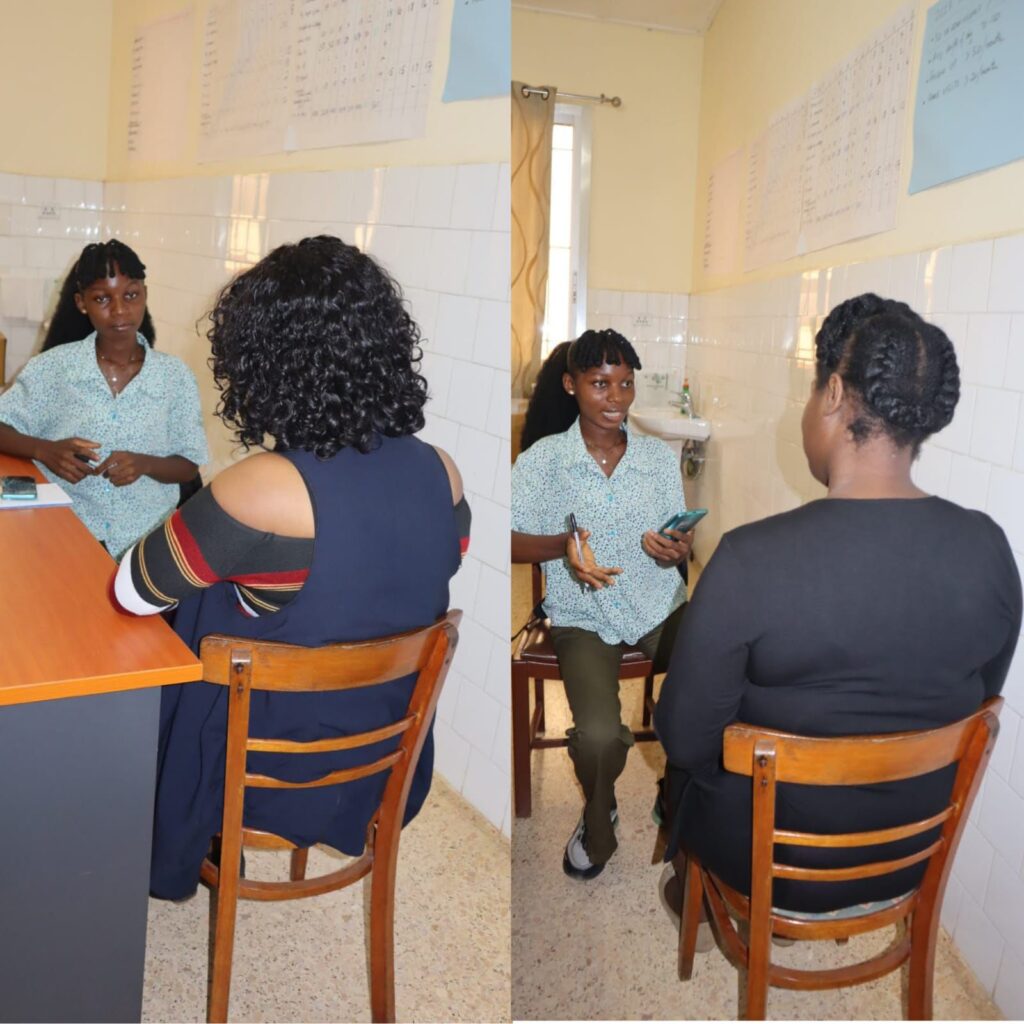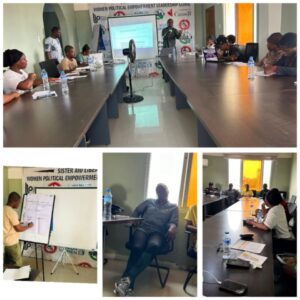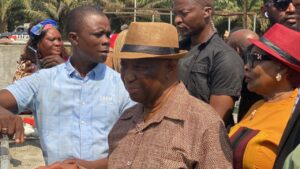Mental Health Survivors Speaking for the Voiceless in the Dark

By: Laymah Kollie
Liberia (May 29, 2024): Mental health is a stealthy and silent destroyer of millions. It often lurks beneath the surface and strikes with devastating psychological and physical consequences.
In Africa, where the ailment is viewed with suspicion and treated as a form of divine retribution, the patients bear an enormous burden of stigma borne of retrogressive cultural beliefs and ignorance.
And like the Chinese say, a journey of a thousand miles starts with one step.
In the case of Mary, Gloria, Siah and Faith, they have 800 miles to free themselves from the shackles of stigma. Their victory is neigh and will be at the vanguard of a determined brigade to tackle mental illness in Liberia. The four are the true heroines speaking for the voiceless in the dark.
“I never understood why I was always treated differently from the rest of my siblings. This left me confused and often angry,” says Mary (not her real name), a young student who has battled mental illness since her childhood.
For as long as she could remember, Mary never did anything right; she suffered rebuke for how she spoke and reacted to anything.
Unknown to her, her parents, too, endured the stigma of her illness.
So was the case with Mary (not real name) when she first suffered a mental breakdown. Mary found herself in a lot of confusion with her family, the neighbors, and people she would necessarily encounter during the day.
The young student who did grow up normal now became a distraction to her parents as she would literally react to every situation wrongly.
“I found myself in a lot of confusion, I kept getting in confusion and my parents saw it as strange. Reacting to people’s behavior wrongly. It wasn’t anything that showed in my face that I had a mental illness.”
Mental illness can be experienced differently, people tend to have different signs and behavior change. Some might get gradually unstable while others may have a total fallback at once.
For Gloria (not real name) isolation began her experience. The once upon a time lively working lady began to distance herself from family members, relatives, and co-workers too. Her social life fell apart, leading to breaking up with her partner (relationship) and losing her job at the same time.
“I was living my normal life working, going to school but all of a sudden everything changed. My social life changed, I started locking myself up in the room, I didn’t want to talk to family members, I refused to eat and couldn’t sleep, I became tearful and felt I wasn’t needed on earth. I was 32 when it started. I lost my job and everything, my relationship too” she narrated.
On the other hand, Siah and Faith (not real name) experiences were a “shut down at once” experience . The good looking lady (Siah) who had gone to the United States to visit a friend got a shock one night, leaving everyone concerned. The incident which they thought would be a manner issue now turned out to be something that could take Siah away from her family for many years.
Depression became the fate of Siah, this created an atmosphere of self-isolation, and social disorder.
“I got sick in the year 2000, I have been on and off on different anti-depressants. Sometimes I isolate myself, sometimes I don’t want to see people. People shy away from me, my social life used to be poor” Said narrated.
“I just got sick and was rushed to the hospital, that’s how I never understood myself again” Faith recalled.
According to the World Health Organization 2016 report, As many as 1 in 5 Liberians suffer a mild to moderate mental disorder.
A 2022 World Health Organization report states that across the African Region, more than 116 million people were already estimated to be living with mental health conditions.
Moreover, the latest (2023) World Health Organization (WHO) World Mental Health Report finds that a staggering one billion people (more than one in eight adults and adolescents) worldwide have a mental disorder. Depression (280 million people) and anxiety (301 million) are the largest groups, but also developmental disorders, attention-deficit hyperactivity disorder, schizophrenia, bipolar and conduct disorders affect millions of people worldwide.
Liberia as a country has a single semi-government owned impatient mental health facility in the West African Region. E S Grant Mental Health Hospital, a lone mental health hospital operating under the umbrella of the John F. Kennedy Memorial offers treatment in public services to citizens through a “fee for service” basis and under very limited resources.
Even though there are other mental health services being offered by the government in Bong, Margibi and Grand Gedeh Counties, Dr. Moses Ziah, Director of the Mental Health Unit at the Ministry of Health in Liberia says there’s a huge challenge in medication supply to patients in the country. According to Dr. Ziah, patients visiting the centers are usually given drug prescriptions to purchase outside the center as a means of getting treatment.
“They are having challenges with medication for mental health patients.
They do prescription to give to patients.
Many of the illnesses are chronic and they usually come back”.
“JFK does fees for service, patients are treated from home. The entity is not a government support program. They are provided support when needed. Patients can be given prescriptions and put on schedule for treatment” Dr. Ziah said.
However, that has not been the case for Siah, Gloria, and Mary, who were fortunate to have encountered the St. Benedict Menni Mental Health Centre in pipeline, Montserrado County. Their journey to the rehabilitation center brought relief and restoration of their sanity.
St. Benedict Menni Mental Health Centre since its operation in Liberia for 5 years has catered to over 200 patients, exclusively women, who have attended the program, of which about 75% are stable and reintegrated into their respective communities through a multi-disciplinary approach. The entity is a Non-profit, faith based (Catholic) Institution run by the Sisters Hospitallers of the Sacred heart of Jesus.
From being mental health patients to women of excellence pursuing goals and reaching heights in their little corners. Mary after undergoing the program has gained stability and now returned to school in one of Liberia’s precious Universities (Stella Maris Polytechnic University) studying Accounting while working at a law firm in Monrovia.
“Now I feel great, I feel calm, I feel happy. It’s not anything that we should feel stereotyped about, it’s curable” she narrated.
For Gloria, even though she lost her relationship in the process, her job was restored with the help of the Administrators at the St. Benedict Menni Mental Health Centre upon her completion of the program.
“After I concluded the program here, the administration wrote a letter to my job site and asked them to reinstate me which they did.
I’m okay now when I compare my life to before it is better now” Gloria said.
Like Mary and Gloria, Siah and Faith are now business managers. Siah now manages her Sister’s uptown business while Faith runs her personal brand. Aside from her business, Faith is also a seamstress and was fortunate to marry the love of her life after completing the mental health program.
“Mental illness is real, many people in our country when they are suffering from mental illness, they take them to sick bush, to prayer banks and even consider them to be witchcraft” Siah laments.
“People should not be making mockery out of us; we are not witches. Let them treat us well” Faith added.
Meanwhile, Mr. Ato Kwamena Sagoe, psychiatric Nurse and Program Coordinator of the St. Benedict Menial Mental Hospital sees acceptance of Mental Health conditions as a global problem. Both family members and patients find it very difficult in accepting the condition when they are faced with it. This, he believes, is a huge challenge in curing the problem.
“It’s a global problem of people having limited insight about mental health.
Family support is one challenge. They abandon them, no financial, emotional, and physical support.”
Unlike Liberia, some countries are making progress in the fight against mental health, such as Cape Verde, Kenya, Mozambique, Rwanda, and Uganda where governments have committed to decentralizing mental health services, moving away from institution-based care, and strengthening care at primary health and community levels.
To enhance its capacity for mental ailment treatment, the Government of Liberia through the Ministry of Health plan to build a fully-owned government facility to holistically care for the ever-rising number of patients.
According to Dr Ziah, the government is in the process of procuring land space to build the country’s owned psychiatric hospital where patients can seek medical treatment gradually.
“Right now, as we speak we are in the process of procuring a space to build a new Psychiatric Hospital for the country and it’s going to be a public facility,” he added.
He said the government is also partnering with NGOs like MSF. (Doctors Without Borders/Medicines San Frontières) to provide medication for patients visiting the mental health service centers in the counties.



